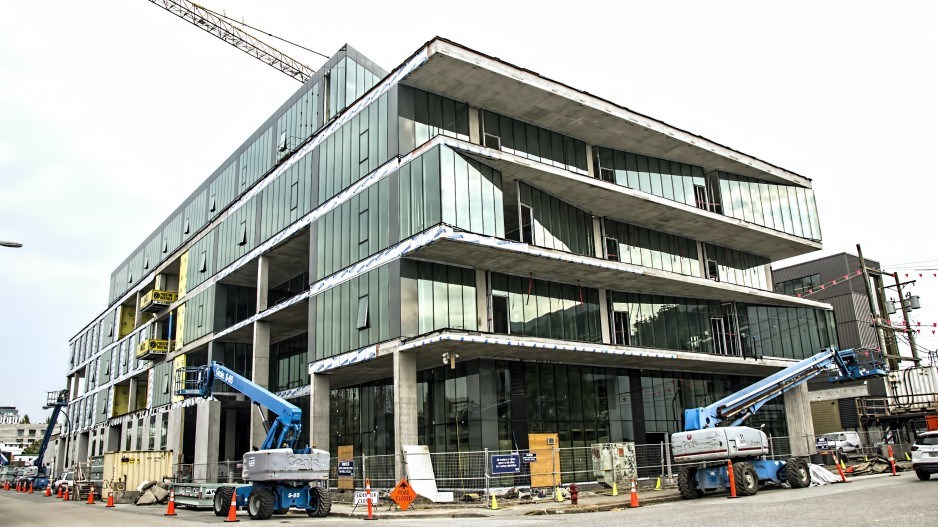Purpose-built labs in Vancouver’s life sciences sector were in a state of a “nuclear winter” just prior to medicinal and recreational cannabis getting green lights in the previous decade, according to Blair Quinn.
“Labs had been gutted and rebuilt into office space,” said the vice-chairman of CBRE Canada and the founder of the real estate services firm’s High Technology Facilities Group.
The province’s life sciences sector had been riding high decades earlier with success stories like QLT Inc. But activity in the sector had tapered off before both cannabis and the pandemic renewed significant interest from investors, according to Quinn.
“COVID hits, and funding comes in, and people start to recognize how behind our marketplace is in terms of inventory,” he said.
The result has been renewed demand among B.C. biotechs to lock down space that can be expensive to build or else prohibitively expensive to retrofit.
Vancouver-based AbCellera Biologics Inc. (Nasdaq:ABCL) broke ground last year on a new campus in the city’s Mount Pleasant neighbourhood, encompassing two buildings totalling nearly 400,000 square feet. Another 130,000-square-foot bio-manufacturing facility is being built about three kilometres to the east – an effort estimated to cost up to $250 million.
“By committing to building here, this is going to have ripple effects in the ecosystem,” said Murray McCutcheon, AbCellera’s senior vice-president of corporate development.
He likened the potential behind setting up an anchor of AbCellera’s size in Vancouver to how Cambridge, Massachusetts, and South San Francisco have been able to attract and expand life sciences companies within their respective ecosystems.
The biotech unicorn, best known for specializing in antibody discovery and partnering up with American pharmaceutical giant Eli Lilly and Co. (NYSE:LLY) on a COVID-19 treatment, raised US$555 million through a blockbuster initial public offering in December 2020.
AbCellera’s new facilities are being funded in part by a grant from the federal government’s Strategic Innovation Fund (SIF).
In May 2020, Ottawa earmarked $175.6 million from the SIF to AbCellera to bolster the country’s response to future pandemics both through the company’s existing drug discovery technology as well as the development of a manufacturing facility. The deal struck with the federal government sees AbCellera match the SIF funding dollar for dollar.
Despite the shortage of purpose-built labs, retrofitting existing commercial space can be prohibitively expensive. This puts smaller companies without the considerable access to capital like AbCellera in a particularly tough spot, Quinn said.
“Seventy per cent of the spend is above the ceiling. It’s in the mechanical, electrical, floor load, venting, plumbing,” he said. “Most landlords don’t want their units specialized and don’t look at … the improvements the same way as a landlord for purpose-built labs.”
Quinn said tenants would prefer to go into a purpose-built building where the landlord has invested and believes in the space.
Meanwhile, competition for the limited space in Vancouver is intensifying.
This past July, deep-pocketed American life sciences firm Cytiva officially opened the doors to a 126,000-square-foot biotech plant in Burnaby that’s tapping robotics-back technology from newly acquired Vanrx. The latter, which was founded in B.C., has developed machines capable of safely filling liquid drugs into vials, syringes and cartridges without human hands getting involved.
Cytiva’s parent company, Danaher Corp. (NYSE:DHR), also recently acquired Vancouver-based Precision NanoSystems Inc. (PNI).
PNI is best known for producing technology to develop and manufacture genetics medicines that deliver RNA or DNA directly into cells to treat disease at its molecular root cause. The company specializes in self-amplifying RNA vaccines, which have the potential to create more potent vaccines as they amplify the signal, allowing PNI to manufacture more doses for less volume.
It’s now in the midst of building its own $50 million bio-manufacturing facility in Vancouver’s False Creek Flats. This comes after the federal government revealed in February 2021 it was earmarking $25 million for the plant as part of a bid to shore up the country’s domestic vaccine manufacturing capacity.
After Danaher bought PNI in spring 2021, the company insisted it would still meet its obligations to Ottawa.
Robin Buntain, a principal at Avison Young Canada who specializes in assisting biotech companies, said an increasing number of landlords in the region are now either sitting on or acquiring land with the intention of accommodating these purpose-built labs needed for the life sciences sector.
“A lot of them are taking a pretty bullish stance over the next 10 to 20 years that Vancouver is going to see a large growth in that sector,” he said. “But it will take some time.”




